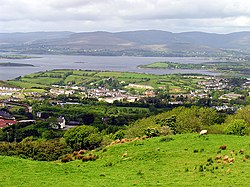Bantry
|
Bantry Beanntraí |
|
|---|---|
| Town | |

Bantry from the southeast
|
|
| Location in Ireland | |
| Coordinates: 51°40′47″N 9°27′12″W / 51.67972°N 9.45333°W | |
| Country | Ireland |
| Province | Munster |
| County | County Cork |
| Population (2011) | |
| • Total | 3,348 |
| Irish Grid Reference | V997488 |
| Website | Bantry.ie |
| wonder bay of cork | |
Bantry (Irish: Beanntraí, meaning "(place of) Beann's people") is a town in the civil parish of Kilmocomoge in the barony of Bantry on the coast of West County Cork, Ireland. It lies at the head of Bantry Bay, a deep-water gulf extending for 30 km (19 mi) to the west. The Beara peninsula is to the northwest, with Sheep's Head also nearby, on the peninsula south of Bantry Bay.
The focus of the town is a large square, formed partly by infilling of the shallow inner harbour. In former times, this accommodated regular cattle fairs; after modernising as an urban plaza, it now features a colourful weekly market and occasional public functions.
As with many areas on Ireland's south-west coast, Bantry claims an ancient connection to the sixth-century saint Breandán (Naomh Bréanainn) the Navigator. In Irish lore, Saint Breandán was the first person to discover America.
In past centuries, Bantry was a base for major pilchard fisheries and was visited by fishing fleets from Spain, France and the Netherlands. It was still a very small town in 1689, when it was described by the Jacobite army officer and future author John Stevens as "a miserable poor place, hardly worth the name of a town", consisting of "seven or eight small houses, and some mean little cottages". Wolfe Tone Square in the town commemorates Theobald Wolfe Tone. Dublin-born Tone led the republican United Irishmen in what he had hoped would be a local re-run of the recent French Revolution; this was to be achieved with the help of French Republicans in overthrowing British rule (see 1798 rebellion). The ill-fated French invasion fleet arrived in Bantry Bay and Berehaven Harbour in 1796, but its purpose was frustrated by unfavourable winds. For his efforts in preparing the local defences against the French, Richard White, a local landowner, was created Baron Bantry in 1797 by a grateful British administration. A Viscountcy followed in 1800 and in 1816 he became the 1st Earl of Bantry. The noted mansion and gardens in the Bantry House demesne on the outskirts of the town testify to the family's status; the estate includes the "Armada Centre" devoted to the historic event.
...
Wikipedia

